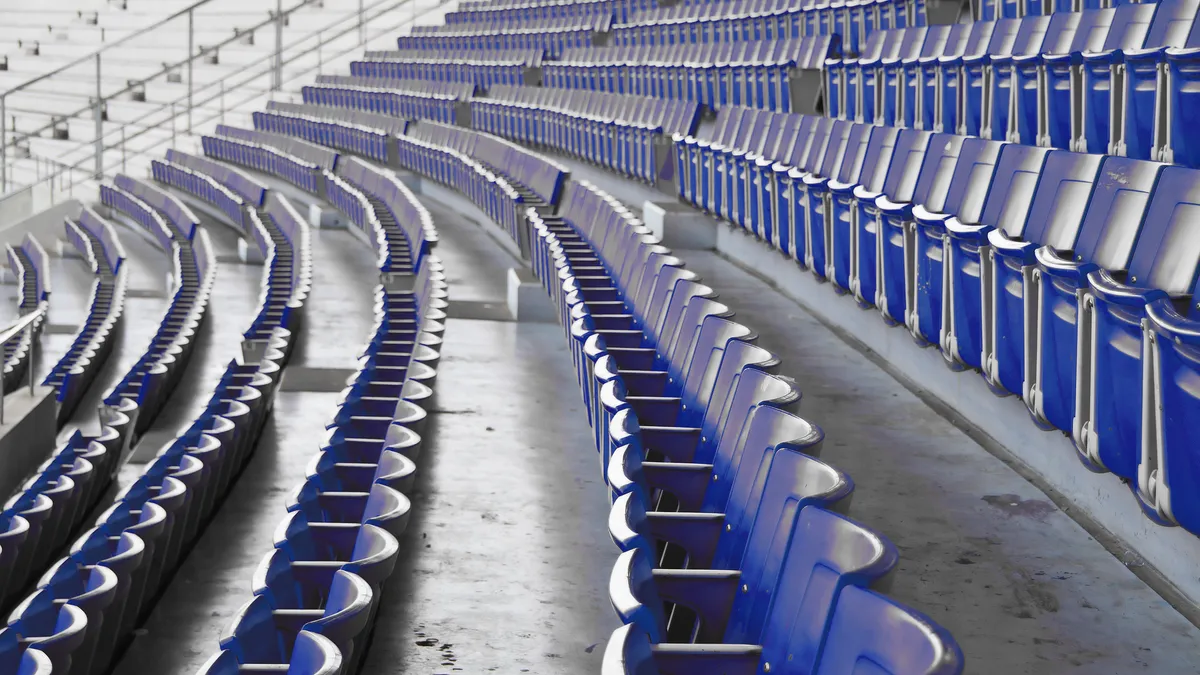Dive Brief:
- Seven in 10 senior leaders across NCAA Division I institutions expect the pandemic to cause athletic department revenue to fall by more than 20% for the 2020-21 fiscal year, according to a recent poll by Teamworks, which provides software for athletic departments.
- They expect revenue streams from ticket sales, followed by NCAA and conference distributions and the combination of corporate sponsorships, advertising and licensing, to be most affected by the crisis.
- The survey, which polled 300 officials in mid-July, also highlights how colleges are maintaining their sports programs as they cancel or reduce competitions for the fall.
Dive Insight:
Fall sport athletes often arrive early to campus, where they live and train together as they prepare for the season ahead. This year, however, that preseason training has come with outbreaks of the coronavirus within athletic departments on several campuses — spurring colleges and conferences to cancel or significantly pare back their competition schedules. And it is raising questions about the safety of reopening campus more fully.
Still, some colleges appear to be continuing practices on campus, and the NCAA has issued guidelines for doing so. Student-athletes at Towson University, for instance, will be able to continue to practice within the parameters of safety guidelines, the public Maryland institution announced earlier this month.
When asked by Teamworks whether they had to suspend voluntary on-campus practices because of a positive coronavirus test, 81% of the 144 respondents to that question said no. However, the majority of survey participants indicated some student-athletes and staff tested positive for the virus.
For student-athletes, officials felt the pandemic had the biggest impact on whether they could keep up with training, followed by their mental health and academic progress.
To prevent the spread of the virus, nearly all officials said they were increasing sanitization, mandating face masks, training in a socially distanced manner, conducting daily wellness screens and testing for the virus. Just under two-thirds required "signed acknowledgment" of new policies and procedures.
Testing for the virus is central to campuses' reopening plans, which includes athletic departments. One-fourth of 127 respondents said they were reporting test results daily, while 39% were doing so less than once a week.
Meanwhile, coronavirus cases around the country have surged in recent weeks, affecting not only student-athletes' ability to participate in competitions but also fans' ability to attend them.
When announcing the NCAA's guidelines earlier this month, the organization's president, Mark Emmert, said "the data point in the wrong direction," and if there were to be a fall sports season, "we need to get a much better handle on the pandemic."
A third of 119 respondents to Teamworks' survey believe their football teams would only play conference games this fall. Around 24% said they'd do so in the spring. A similar share said they wouldn't play football at all this school year. Most respondents expect their stadiums will be at or under half-capacity for football games.
Non-football administrators did not answer questions pertaining to football, Teamworks noted in an email to Education Dive.
Broadly, 91% of 115 officials surveyed said they cut team operating budgets to address the pandemic’s financial impacts so far. Around 41% have furloughed staff, and 22% laid off personnel.














